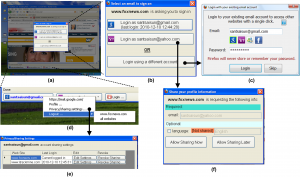 My Ph.D. student San-Tsai Sun has successfully defended and submitted the final version of his thesis “Towards Improving the Usability and Security of Web Single Sign-On Systems.” He’s moving back to industry, where he will be applying his expertise in web security to real-world systems. Congratulations to San-Tsai on very successful completion of the Ph.D. program, with many quality publications.
My Ph.D. student San-Tsai Sun has successfully defended and submitted the final version of his thesis “Towards Improving the Usability and Security of Web Single Sign-On Systems.” He’s moving back to industry, where he will be applying his expertise in web security to real-world systems. Congratulations to San-Tsai on very successful completion of the Ph.D. program, with many quality publications.
Category Archives: web single sign on
San-Tsai Sun defends his Ph.D. dissertation on Web Single Sign-On Systems and graduates
The Devil is in (Implementation) Details
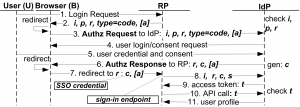 It’s hard to get a security protocol right. It seems even harder to get its implementations right, even more so when millions use it on daily basis. LERSSE’s Sun-Tsai will present at ACM CCS this October several critical vulnerabilities he has uncovered in implementation of OAuth 2.0, used by Facebook, Microsoft, Google, and many other identity providers and relying parties. These vulnerabilities allow an attacker to gain unauthorized access to the victim user’s profile and social graph, and impersonate the victim on the RP website. Continue reading
It’s hard to get a security protocol right. It seems even harder to get its implementations right, even more so when millions use it on daily basis. LERSSE’s Sun-Tsai will present at ACM CCS this October several critical vulnerabilities he has uncovered in implementation of OAuth 2.0, used by Facebook, Microsoft, Google, and many other identity providers and relying parties. These vulnerabilities allow an attacker to gain unauthorized access to the victim user’s profile and social graph, and impersonate the victim on the RP website. Continue reading
Systematically breaking and fixing OpenID security
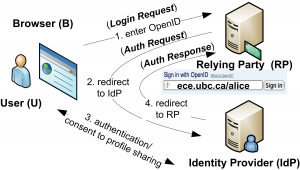 Do you use OpenID? I bet you do, even if you don’t know this. OpenID 2.0 is a user-centric Web single sign-on protocol with over one billion OpenID-enabled user accounts, and tens of thousands of supporting websites. Well, the security of this protocol is clearly critical! Yet, its security analysis has only been done so far in a partial and ad-hoc manner. LERSSE Ph.D. candidate San-Tsai Sun performed a systematic analysis of the protocol using both formal model checking and an empirical evaluation of 132 popular websites that support OpenID. Continue reading
Do you use OpenID? I bet you do, even if you don’t know this. OpenID 2.0 is a user-centric Web single sign-on protocol with over one billion OpenID-enabled user accounts, and tens of thousands of supporting websites. Well, the security of this protocol is clearly critical! Yet, its security analysis has only been done so far in a partial and ad-hoc manner. LERSSE Ph.D. candidate San-Tsai Sun performed a systematic analysis of the protocol using both formal model checking and an empirical evaluation of 132 popular websites that support OpenID. Continue reading
Towards Usable Web Single Sign-On
OpenID is an open and promising Web single sign-on (SSO) solution. The research led by my Ph.D. student San-Tsai Sun investigates the challenges and concerns web users face when using OpenID for authentication, and identifies what changes in the login flow could improve the users’ experience and adoption incentives. Continue reading
Have users signed up?
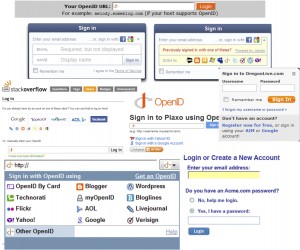 I participated in a panel “Password Managers, Single Sign-On, Federated ID: Have users signed up?” at Workshop on The Future of User Authentication and Authorization on the Web: Challenges in Current Practice, New Threats, and Research Directions, which was collocated with the conference on Financial Cryptography and Data Security. In my panel presentation, I showed the most recent results of the evaluation of OpenID authentication experience by participants, conducted in my lab, which shed some light on why users have not signed up, at least for OpenID. An apparent reluctance among the end users of employing OpenID, despite the fact that there are over one billion OpenId-enabled accounts, results from technical, business, and human factors. This particular short presentation was devoted to the usability factors.
I participated in a panel “Password Managers, Single Sign-On, Federated ID: Have users signed up?” at Workshop on The Future of User Authentication and Authorization on the Web: Challenges in Current Practice, New Threats, and Research Directions, which was collocated with the conference on Financial Cryptography and Data Security. In my panel presentation, I showed the most recent results of the evaluation of OpenID authentication experience by participants, conducted in my lab, which shed some light on why users have not signed up, at least for OpenID. An apparent reluctance among the end users of employing OpenID, despite the fact that there are over one billion OpenId-enabled accounts, results from technical, business, and human factors. This particular short presentation was devoted to the usability factors.
Is OpenID too Open? Technical, Business, and Human Issues That Get in the Way of OpenID and Ways of Addressing Them
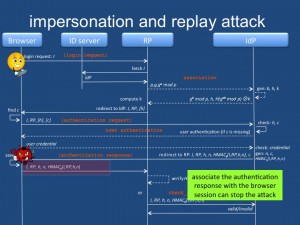 The web is essential for business and personal activities well beyond information retrieval, such online banking, financial transactions, and payment authorization, but reliable user authentication remains a challenge. OpenID is a mainstream Web single sign-on (SSO) solution intended for Internet-scale adoption. There are currently over one billion OpenID-enabled user accounts provided by major content-hosting and service providers (CSPs), e.g., Yahoo!, Google, Facebook, but only a few relying parties that allow users to use their OpenID credentials for SSO. Why is that? I presented at Eurecom an overview OpenID, and then discussed weaknesses of (1) the protocol and its implementations, (2) the business model behind it, and (3) the user interface. The talk concluded with a discussion of a proposal for addressing some of OpenID issues.
The web is essential for business and personal activities well beyond information retrieval, such online banking, financial transactions, and payment authorization, but reliable user authentication remains a challenge. OpenID is a mainstream Web single sign-on (SSO) solution intended for Internet-scale adoption. There are currently over one billion OpenID-enabled user accounts provided by major content-hosting and service providers (CSPs), e.g., Yahoo!, Google, Facebook, but only a few relying parties that allow users to use their OpenID credentials for SSO. Why is that? I presented at Eurecom an overview OpenID, and then discussed weaknesses of (1) the protocol and its implementations, (2) the business model behind it, and (3) the user interface. The talk concluded with a discussion of a proposal for addressing some of OpenID issues.
See presentation slides for more details.
CHI Work in Progress to Feature LERSSE Research
This year, in Vancouver, Work In Progress Posters session of SIG CHI Conference will feature three research projects of my graduate students.
